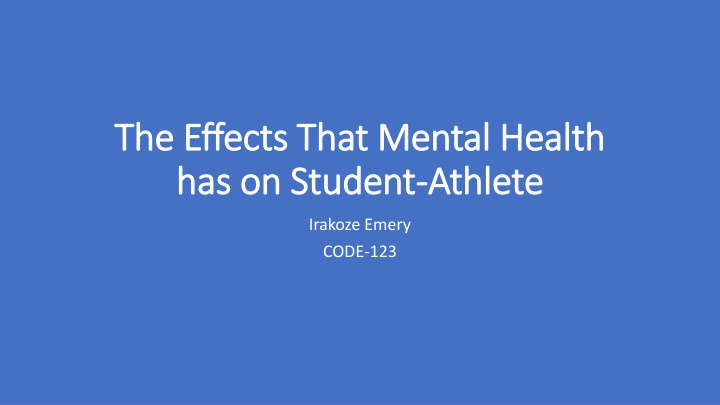Impact of Mental Health on Student-Athletes: A Comprehensive Analysis
Research examines the prevalence of mental health issues in student-athletes versus non-athletes, highlighting stressors, risks, and potential interventions. The study's rationale delves into the need for further exploration to understand this relationship fully.
Download Presentation

Please find below an Image/Link to download the presentation.
The content on the website is provided AS IS for your information and personal use only. It may not be sold, licensed, or shared on other websites without obtaining consent from the author.If you encounter any issues during the download, it is possible that the publisher has removed the file from their server.
You are allowed to download the files provided on this website for personal or commercial use, subject to the condition that they are used lawfully. All files are the property of their respective owners.
The content on the website is provided AS IS for your information and personal use only. It may not be sold, licensed, or shared on other websites without obtaining consent from the author.
E N D
Presentation Transcript
The Effects That Mental Health The Effects That Mental Health has on Student has on Student- -Athlete Athlete Irakoze Emery CODE-123
Introduction Purpose: The primary focus was to find if there was a higher prevalence of mental health issues in student-athletes compared to non-athletes. The secondary purpose was to see if being a student-athlete would have an impact on the likeliness on struggling with your mental health.
Literature Review Research has consistently shown that student-athletes are at increased risk for mental health issues such as anxiety, depression, and stress compared to non-athletes (Reardon et al., 2019). The demands of being a student-athlete can lead to high levels of stress, as student-athletes must balance the demands of schoolwork and sports while also dealing with injuries, time constraints, and pressure to perform well (Becker & Wrisberg, 2020). In addition, student-athletes may experience unique stressors such as the threat of losing their scholarship, the pressure to maintain a certain weight, and the possibility of being cut from the team (Wolanin et al., 2015). One study found that the mental health of student-athletes declined as they progressed through their college years (Gallagher et al., 2022). Specifically, they reported increased symptoms of depression, anxiety, and stress as they advanced from their freshman to senior year. Another study found that female student-athletes were at higher risk for depression and anxiety than male student-athletes (Yang et al., 2016). Despite the potential negative impacts of being a student-athlete on mental health, research also suggests that sports participation can have positive effects on mental health. For example, exercise has been shown to have a positive impact on mood and can reduce symptoms of depression and anxiety (Lederman et al., 2018). In addition, participating in team sports can provide a sense of belonging and social support, which can buffer against the negative effects of stress (Poczwardowski et al., 2017).
Study Rationale Given the conflicting findings in the literature regarding the mental health impacts of being a student-athlete, further research is needed to fully understand the relationship between sports participation and mental health. Specifically, future studies should aim to: a. Explore the unique stressors and challenges faced by student- athletes and how they impact mental health. b. Examine the factors that may buffer against the negative effects of stress on mental health in student-athletes, such as social support. c. Investigate potential interventions that can help promote positive mental health outcomes for student-athletes.
Limitation Delimitation There was lack of empirical research Limitation due to the limited availability of studies done on student athletes The studies relied on self- reported data, which might have been subject to bias The studies used a convenience sample, which may not be representative of the larger population of athletes The studies were conducted with small sample sizes
Keywords College student-athletes Mental health anxiety Stress
Research Questions How does being a student-athlete affect your mental health What are the mental health challenges for student-athletes
Methodology The study will use a mixed-methods approach, combining quantitative and qualitative data collection methods. The study will recruit a sample of NCAA Division I student-athletes and non-athlete students from multiple universities. The quantitative phase will involve administering standardized questionnaires to both groups to measure mental health symptoms, athletic identity, and other relevant factors. The qualitative phase will involve conducting focus group discussions and individual interviews to gain a deeper understanding of the experiences of student-athletes and non-athletes regarding mental health.
Data Analysis The quantitative data will be analyzed using descriptive statistics, including means and standard deviations, and inferential statistics, including t-tests and ANOVA, to compare mental health symptoms between student-athletes and non-athletes. Regression analyses will be conducted to identify predictors of mental health symptoms among student-athletes. The qualitative data will be analyzed using content analysis to identify themes and patterns.
Survey https://siue.co1.qualtrics.com/jfe/form/SV_734pgFPg03wqEZg























